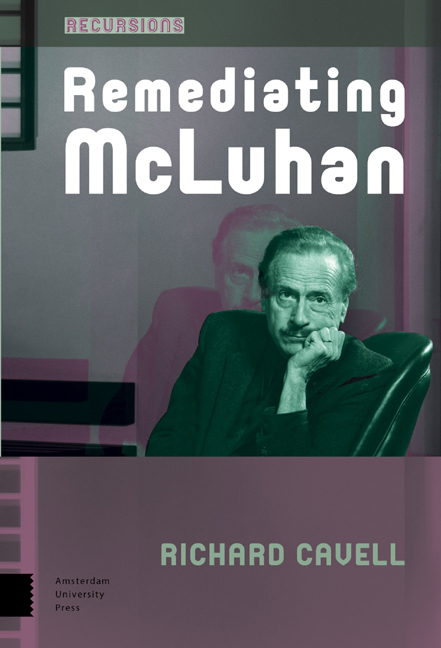Book contents
- Frontmatter
- Dedication
- Contents
- Introduction
- List of sigla
- I
- Re: Mediation
- 1 Beyond McLuhanism
- 2 McLuhan and the Question of the Book
- Embodiment as Incorporation
- 3 McLuhan and the Body as Medium
- 4 McLuhan, Tactility, and the Digital
- 5 Mechanical Brides and Vampire Squids
- Empathic Media
- 6 McLuhan: Motion: e-Motion: Towards a Soft Ontology of Media
- 7 Re-Mediating the Medium
- Determining Technology
- 8 McLuhan, Turing, and the Question of Determinism
- 9 Angels and Robots
- Being Mediated
- 10 Marshall McLuhan’s Echo-Criticism
- 11 McLuhan and the Technology of Being
- II
- 12 The Tragedy of Media: Nietzsche, McLuhan, Kittler
- Coda: On the 50th Anniversary of Understanding Media
- Notes
- Works Cited
- Index
5 - Mechanical Brides and Vampire Squids
Published online by Cambridge University Press: 12 December 2020
- Frontmatter
- Dedication
- Contents
- Introduction
- List of sigla
- I
- Re: Mediation
- 1 Beyond McLuhanism
- 2 McLuhan and the Question of the Book
- Embodiment as Incorporation
- 3 McLuhan and the Body as Medium
- 4 McLuhan, Tactility, and the Digital
- 5 Mechanical Brides and Vampire Squids
- Empathic Media
- 6 McLuhan: Motion: e-Motion: Towards a Soft Ontology of Media
- 7 Re-Mediating the Medium
- Determining Technology
- 8 McLuhan, Turing, and the Question of Determinism
- 9 Angels and Robots
- Being Mediated
- 10 Marshall McLuhan’s Echo-Criticism
- 11 McLuhan and the Technology of Being
- II
- 12 The Tragedy of Media: Nietzsche, McLuhan, Kittler
- Coda: On the 50th Anniversary of Understanding Media
- Notes
- Works Cited
- Index
Summary
One has to enquire into the ontological status of apparatuses, their level of existence. They are indubitably things that are produced, i.e. things that are pro-duced (brought forward) out of the available natural world. The totality of such things can be referred to as culture.
Vilém Flusser, Towards a Philosophy of Photography[M]an in the normal use of technology (or his variously extended body) is perpetually modified by it and in turn finds ever new ways of modifying his technology. Man becomes, as it were, the sex organs of the machine world.
Marshall McLuhan, Understanding MediaWhile there is much that divides Marshall McLuhan (1911-1980) and Vilém Flusser (1920-1991), the confluence afforded by the prospect of discussing them together allows us to consider what I suggest is a central strand of connection, namely their tendency to understand media as embodied, which is to say, as having a relationship with bios. This is a paradoxical dimension of their work, however, because the element of embodiment is configured according to a principle of alienation, such that the closer our relationship to media becomes, the further we get from the classic notion of the sovereign self. McLuhan had expressed this paradox through the notion of extension and amputation. Flusser, characteristically, expressed the paradox within a philosophical idiom, describing bios as a system of networks that mark a process of estrangement. The paradoxical dimension of these media theorists’ work derives from their experiences of what I have elsewhere called a cultural geography, one which was characterised by a profound sense of displacement that became a key element of the work they produced. Flusser, who fled the Nazis and ended up spending much of his career in Brazil, meditated often on the notion of the bodenlos, which expresses the vertiginous experience of immigration, the experience of never quite arriving— what V.S. Naipaul described as The Enigma of Arrival, which is that, as an immigrant, you never quite do. McLuhan, for his part, experienced the (far less traumatic but none the less real) lostness of the colonial citizen, at once a British Subject and a Canadian—and a Western Canadian at that, far from the centre of political, social and cultural power in Ontario—and therefore neither British, nor fully Canadian, and he characteristically referred to Canada as a ‘borderline’ case.
- Type
- Chapter
- Information
- Remediating McLuhan , pp. 57 - 64Publisher: Amsterdam University PressPrint publication year: 2016



